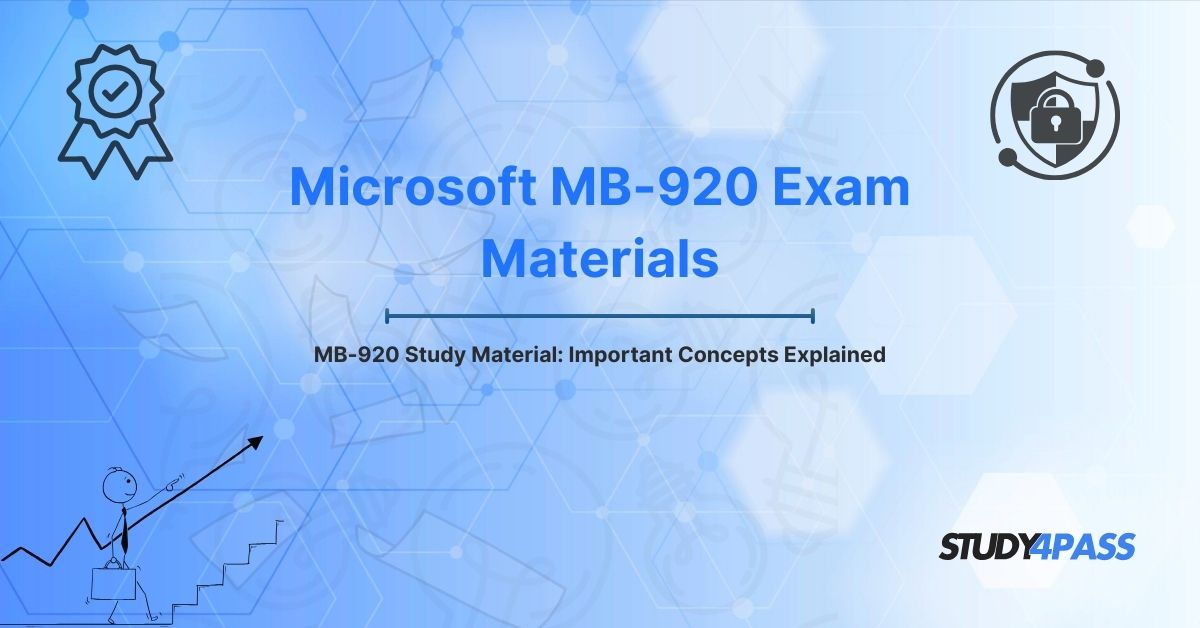The Microsoft MB-920 (Microsoft Dynamics 365 Fundamentals – Finance and Operations Apps) certification is a foundational credential for professionals looking to validate their expertise in enterprise resource planning (ERP) solutions. This exam is designed for those who want to demonstrate their understanding of Microsoft Dynamics 365 Finance, Supply Chain Management, and ERP concepts.
With businesses increasingly adopting cloud-based ERP solutions, professionals with Microsoft MB-920 Certification are in high demand. This article explores the key concepts covered in MB-920 study material, exam preparation strategies, and how Study4Pass can help you succeed.
Enterprise Resource Planning (ERP): An Introduction
What is ERP?
Enterprise Resource Planning (ERP) refers to integrated software solutions that help organizations manage core business processes such as:
- Finance & Accounting
- Supply Chain & Procurement
- Manufacturing & Operations
- Human Resources & Payroll
Why is ERP Important?
- Streamlines Operations: Eliminates data silos by integrating departments.
- Improves Decision-Making: Real-time analytics and reporting.
- Enhances Efficiency: Automates repetitive tasks.
- Scalability: Grows with business needs.
Microsoft Dynamics 365: The Next-Gen ERP
Microsoft Dynamics 365 combines ERP and CRM (Customer Relationship Management) into a unified cloud platform. The Finance and Operations Apps (now split into Finance and Supply Chain Management) provide advanced tools for:
- Financial Management
- Inventory & Warehouse Management
- Manufacturing & Production Planning
- Retail & Commerce
Understanding MB-920 Study Material Scope
Overview of Microsoft Dynamics 365 ERP
The MB-920 exam focuses on:
- Core ERP functionalities in Dynamics 365
- Cloud vs. On-Premise Deployment
- Integration with Power Platform (Power BI, Power Apps, Power Automate)
- Security & Compliance in Dynamics 365
Importance for Certification
Passing the MB-920 exam proves you understand:
- How Dynamics 365 Finance & Operations Apps work
- Key ERP workflows
- Basic configuration and reporting
Focus on Core Concepts
To pass the MB-920 exam, you must master:
✔ Dynamics 365 Finance Features (General ledger, budgeting, fixed assets)
✔ Supply Chain Management (Procurement, inventory, warehousing)
✔ Manufacturing Processes (Production orders, lean manufacturing)
✔ Reporting & Analytics (Power BI integration, financial reporting)
✔ Security & Licensing (Role-based security, data compliance)
Key Concepts in MB-920 Study Material
Dynamics 365 Finance Module
- General Ledger: Core accounting functions.
- Accounts Payable & Receivable: Managing vendor and customer transactions.
- Budgeting & Forecasting: Financial planning tools.
- Fixed Assets: Tracking depreciation and asset lifecycle.
Dynamics 365 Supply Chain Management
- Procurement & Sourcing: Vendor management, purchase orders.
- Inventory Management: Stock tracking, warehouse management.
- Transportation & Logistics: Shipment planning, route optimization.
Manufacturing & Production
- Discrete vs. Process Manufacturing: Different production methodologies.
- Production Orders: Managing manufacturing workflows.
- Lean Manufacturing: Reducing waste in production.
Reporting & Business Intelligence
- Power BI Integration: Real-time dashboards.
- Financial Reporting: Balance sheets, profit & loss statements.
- Operational Analytics: Inventory turnover, supply chain insights.
Security & Compliance
- Role-Based Security: Controlling user access.
- Data Encryption & Compliance: GDPR, SOX compliance.
- Audit Trails: Tracking system changes.
MB-920 Certification Exam Objectives
The MB-920 exam tests knowledge across four key areas:
|
Exam Section |
Weightage |
|
Describe Dynamics 365 Finance & Operations Apps |
30-35% |
|
Configure Dynamics 365 Finance & Operations Apps |
20-25% |
|
Use Dynamics 365 Finance & Operations Apps |
20-25% |
|
Implement Dynamics 365 Finance & Operations Apps |
20-25% |
Key Learning Outcomes
- Understanding core ERP workflows in Dynamics 365.
- Configuring basic financial and supply chain modules.
- Using Power BI for reporting.
- Implementing security best practices.
How To Prepare for MB-920 Exam?
- Use Official Microsoft Learning Paths: Microsoft provides free MB-920 study material on its Microsoft Learn platform.
- Take Practice Tests with Study4Pass:
· Simulate real exam conditions with timed tests.
· Identify weak areas with detailed answer explanations. - Hands-on Labs
· Use Microsoft’s trial environment for Dynamics 365.
· Practice creating financial reports, managing inventory, and setting up security roles. - Join Study Groups & Forums:
· Engage with other learners on Microsoft Tech Community.
· Discuss tricky concepts with experts. - Review Case Studies:
· Understand real-world ERP implementations in different industries.
Conclusion
The Microsoft MB-920 certification is a valuable credential for professionals entering the ERP and Dynamics 365 ecosystem. By mastering financial management, supply chain processes, and reporting, you can position yourself as a skilled ERP specialist.
Study4Pass offers high-quality MB-920 study material, including practice tests, exam prep practice test, and detailed guides, to help you pass the exam on your first attempt
Special Discount: Offer Valid For Limited Time “MB-920 Exam Materials”
Sample Questions from Microsoft MB-920 Certification Exam
Which module in Dynamics 365 Finance & Operations is used to track company-wide financial transactions?
A. Accounts Payable
B. General Ledger
C. Fixed Assets
D. Budgeting
What is the primary benefit of using Power BI with Dynamics 365 Finance & Operations?
A. Automating invoice processing
B. Real-time financial dashboards
C. Managing vendor contracts
D. Tracking employee attendance
In Dynamics 365 Supply Chain Management, which feature helps optimize warehouse storage?
A. Production Orders
B. Warehouse Management System (WMS)
C. Vendor Collaboration
D. Transportation Management
Which type of manufacturing in Dynamics 365 is best suited for producing customized products in batches?
A. Process Manufacturing
B. Lean Manufacturing
C. Discrete Manufacturing
D. Project-Based Manufacturing
What is the purpose of role-based security in Dynamics 365 Finance & Operations?
A. To automate financial reporting
B. To restrict user access based on job function
C. To optimize supply chain routes
D. To integrate with third-party apps


